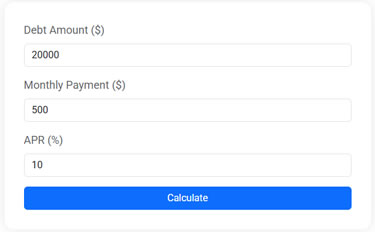The Psychology of Debt: Understanding Your Relationship with Money

This article explores the psychological and emotional dimensions of debt, emphasizing how stress and societal influences can perpetuate financial struggles. It highlights the importance of understanding emotional responses to debt, recognizing the impact of social pressures on spending, and improving financial literacy to make informed decisions. By shifting mindsets and adopting practical strategies, individuals can better manage debt and work towards financial well-being.
Debt. Just reading the word might make your heart race a little faster or your stomach churn. But why does debt trigger such a strong emotional response in so many of us? It's not just about the numbers on a statement or the looming due dates—it's about the intricate web of emotions, beliefs, and societal pressures that surround money. Understanding these psychological dynamics is key to unraveling the complex relationship we often have with debt. By exploring these dimensions, we can begin to shift our mindsets and take steps toward financial well-being.
Money is more than a medium of exchange; it's a powerful force that influences our lives in profound ways. When it comes to debt, the stakes feel even higher. The stress of owing money can seep into all corners of our lives, impacting our mental health, our relationships, and our overall sense of security. So, how can we better understand and manage these psychological aspects? Let's dive into the emotional and societal influences that make debt such a challenging beast to tame.
The Emotional Rollercoaster of Debt
Debt isn't just a financial burden; it can be an emotional one too. The feelings associated with debt can range from anxiety and guilt to shame and even denial. According to a study by the American Psychological Association, money is a leading source of stress for many Americans, with debt being a significant contributor to that stress. When we're in debt, it's easy to fall into a cycle of negative emotions, which can lead to avoidance behaviors. For example, you might ignore your bank statements or delay paying bills, hoping to stave off the stress, but ultimately, this can make the problem worse.
It's crucial to acknowledge these emotions rather than suppress them. Accepting that it's normal to feel stressed or overwhelmed by debt is the first step toward managing it. Think about it like this: recognizing your emotional responses to debt can empower you to address the root causes of your financial struggles. Once you identify how you feel about debt, you can begin to work on changing your mindset and developing healthier financial habits.
The Impact of Social Pressures on Spending
We live in a society that often equates success with material possessions, and this societal pressure can heavily influence our spending habits. Social media doesn't help, either—it's a never-ending highlight reel of vacations, new cars, and designer clothes. This constant exposure can lead to what's known as "keeping up with the Joneses," where we feel compelled to match the perceived lifestyle of our peers, often at the expense of our financial health.
This pressure can lead to overspending and, ultimately, more debt. A survey by Credit Karma found that 39% of millennials have gone into debt to keep up with friends' lifestyles. Understanding these social dynamics is crucial to breaking the cycle. By becoming aware of the external influences on our spending habits, we can make more conscious decisions about what truly adds value to our lives, rather than what just looks good on Instagram.
Debt Payoff Calculator
Plan your financial future by estimating how long it will take to pay off your debt based on your balance, annual percentage rate (APR), and monthly payment. After entering your figures, the calculator determines the number of months needed to fully repay the debt and calculates the total interest paid over time.
Improving Financial Literacy
One of the most effective ways to manage debt is by improving your financial literacy. Understanding the basics of interest rates, credit scores, and personal budgeting can help you make informed decisions about borrowing and spending. Unfortunately, many people feel ill-equipped to navigate these concepts, often due to a lack of education on financial matters. A study by the National Endowment for Financial Education found that only 24% of millennials demonstrate basic financial literacy.
Financial education can empower you to take control of your finances. For instance, knowing how compound interest works can motivate you to pay off credit cards more aggressively. Learning about budgeting can help you allocate your resources more effectively, ensuring that you have enough to cover your needs while also paying down debt. The more you know, the less intimidating debt becomes, and the more equipped you are to tackle it head-on.
Shifting Mindsets and Building Practical Strategies
To conquer debt, it’s essential to shift your mindset from one of scarcity and fear to one of empowerment and possibility. Start by setting clear, achievable financial goals. Whether it's paying off a specific credit card or saving for a down payment on a house, having a tangible target can provide motivation and a sense of direction. Break your goals down into manageable steps to track progress and celebrate small victories along the way.
Additionally, consider adopting practical strategies like the debt snowball or avalanche methods, which involve focusing on paying off either the smallest debts first for quick wins or the highest interest debts to save money over time. Financial advisor Suze Orman often recommends these approaches, emphasizing the psychological boost that comes from seeing debts disappear, which can motivate you to keep going.
Seeking Support and Professional Guidance
Sometimes, managing debt can feel like an uphill battle, and seeking support can make all the difference. Whether it's confiding in a trusted friend or family member or reaching out to a financial advisor, having someone in your corner can provide encouragement and accountability. Moreover, professional guidance can offer personalized strategies tailored to your unique situation.
For those feeling overwhelmed, credit counseling services can help create a plan to manage debt and rebuild credit. These services often provide free or low-cost advice and can negotiate with creditors on your behalf. According to the National Foundation for Credit Counseling, their clients report a significant reduction in financial stress after working with a counselor. Remember, asking for help is a sign of strength, not failure.
Conclusion: The Path to Financial Well-Being
Understanding the psychology of debt is about more than just numbers—it's about recognizing the emotional and societal factors that influence our financial decisions. By gaining insight into these dynamics, improving financial literacy, and adopting a proactive mindset, you can take control of your debt and work toward a healthier relationship with money. Remember, financial well-being is a journey, not a destination, and every step you take brings you closer to the peace of mind you deserve.








